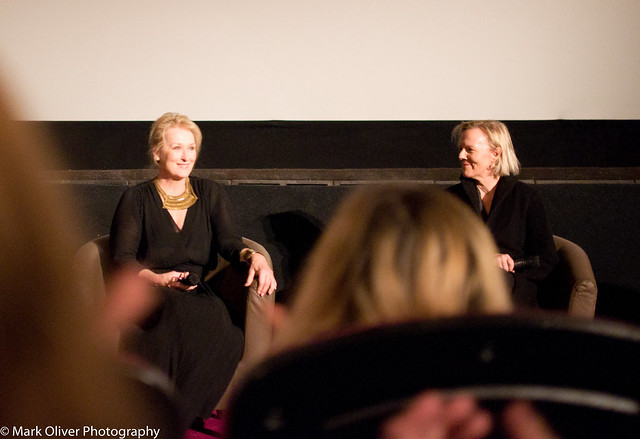Moli Meets Meryl…
Which is was a great start to the year with my first Q & A for 2012 for the film, The Iron Lady…
The film was always going to have the Marmite effect on the public opinion given the subject. Like many, I remember having a low opinion of Thatcher, as did much of her cabinet, which led to her ultimate demise. However, after nearly 22 years since she left office I find myself ambivalent to her and her history. I won’t deny that she had a major influence on British society and this film allows the viewer to bring their own memory of that impact by skirting around the political issues and focusing on the person. Anyone expecting to get any political insights or answers to her more controversial decisions will be disappointed. It’s not about politics. It’s more about the loss of oneself and the equality that we all have in old age and death. In essence, it’s a story about everyone. No matter who we are or were, we could all drop dead washing up a teacup.
Meryl Streep never met Thatcher in her preparation for the role and her performance wasn’t any worse for it. Streep captured the essence of the character without being comical or a spitting image caricature of Thatcher, she told us that she did get advice from Neil Kinnock, former Labour leader and unnamed people who were in her cabinet at the time in order to capture the person. The well researched make up and costume supported what was an award nominating performance. Listening to Streep talk about the role showed that she was a very smart and intuitive actress and to some large degree, much better than the quality of the overall production. Streep’s portrayal of Thatcher’s mental illness was based in artistic license, as this isn’t really known in detail. Only a book by Carol Thatcher, her daughter has given any insight into this and was certainly a catalyst for the movies theme. Therefore it is a weak premise for historical accuracy but fascinating as a subject matter.
Director Phyllida Lloyd whose previous work includes Mamma Mia and writer Abi Morgan (Brick Lane, Shame) chose to tell the story through flashbacks of her life. However, the flashbacks were primarily on her political life without going into any real detail and the hallucinations of the recently passed Dennis Thatcher played by Jim Broadbent. The appearances of Dennis were comical but all too distracting for me and took too much away from the torment of her inability to let him go.
The film didn’t touch on Thatcherism and the rights and wrongs of her career or her time as a Chemist and Barrister, which I feel would have added something to the story. Her desire to be more than a shopkeeper’s daughter is a rag to riches story that missed out her pre political life and her time at Oxford.
The film did nothing to change my opinion of Thatcher, which goes to show how balanced the screenplay was not to glorify or offend. It’s all too easy to demonise someone who, for many people is already demonetized and in contrast to this for some is worshiped and any critical approach would be unwelcome. However the film missed a chance to be something great and Streep was wasted in my opinion.
As always, I say go and see it and make your own mind up,
Moli


